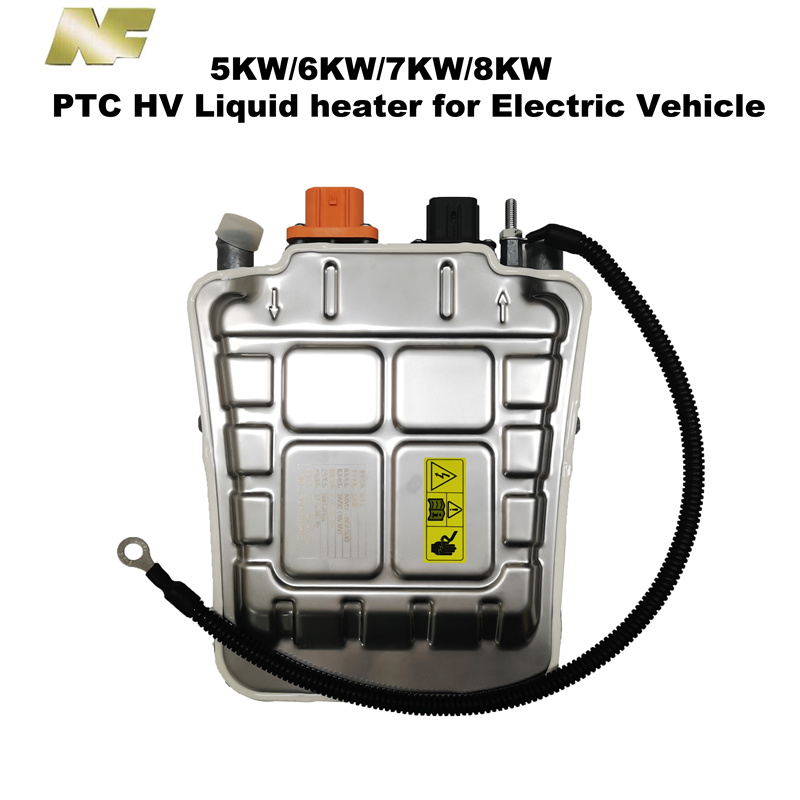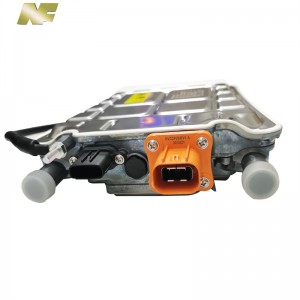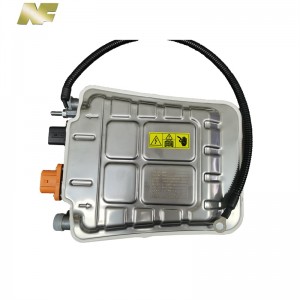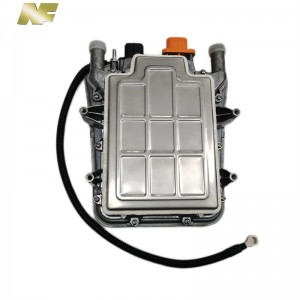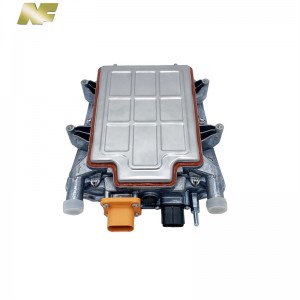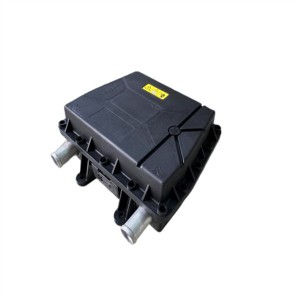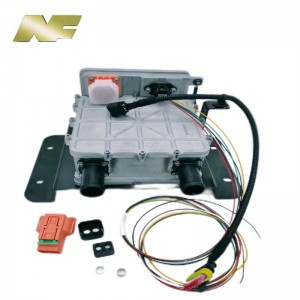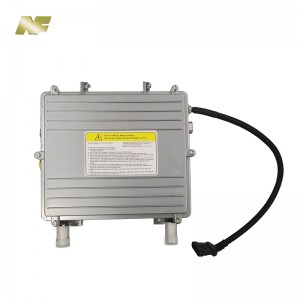NF 7KW HVH 350V/600V High Voltage Coolant Heater 12V/24V PTC Coolant Heater For EV HVCH
Technical Parameter
| Item | W09-1 | W09-2 |
| Rated voltage(VDC) | 350 | 600 |
| Working voltage(VDC) | 250-450 | 450-750 |
| Rated power(kW) | 7(1±10%)@10L/min T_in=60℃,350V | 7(1±10%)@10L/min,T_in=60℃,600V |
| Impulse current(A) | ≤40@450V | ≤25@750V |
| Controller low voltage(VDC) | 9-16 or 16-32 | 9-16 or 16-32 |
| Control signal | CAN2.0B、LIN2.1 | CAN2.0B、LIN2.1 |
| Control model | Gear (5th gear) or PWM | Gear (5th gear) or PWM |
Installation
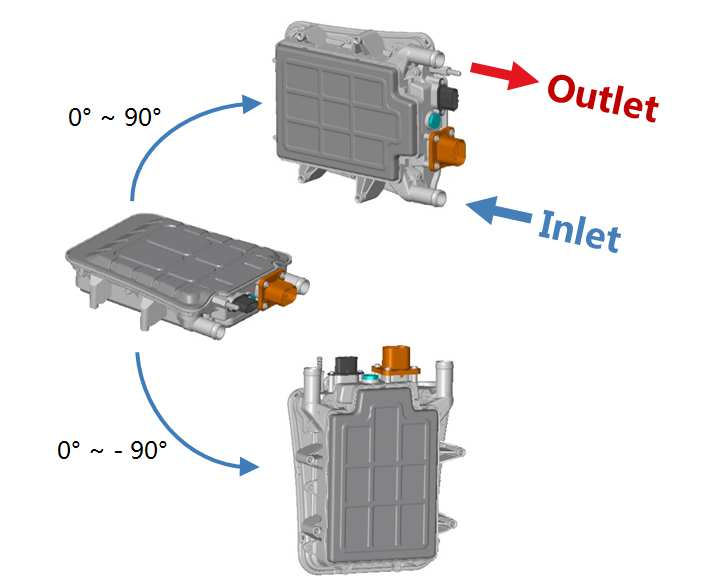
Advantage
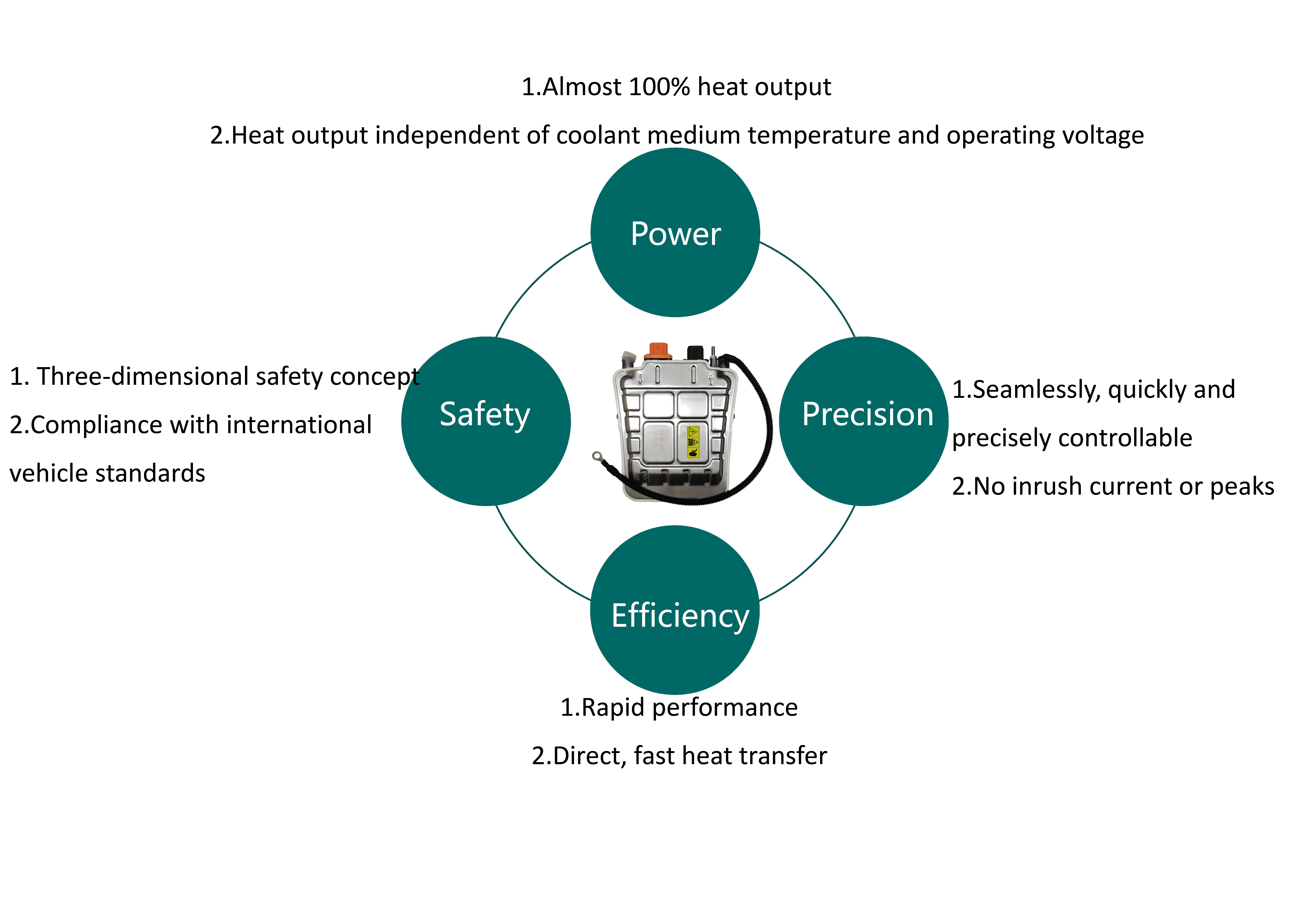
1.Powerful and reliable heat output: fast and constant comfort for the driver, passengers and battery systems.
2. Efficient and rapid performance: longer driving experience without wasting energy.
3.Precise and stepless controllability: better performance and optimized power management.
4.Fast and easy integration: easy control via LIN, PWM or main switch, plug & play integration.
Packaging & Shipping


Description
As the world moves toward a greener future, the automotive industry has experienced a rapid shift toward electric vehicles (EVs). With this shift comes the need for efficient, reliable heating systems, especially in areas that experience harsh winters. In this blog post, we will explore the benefits of adopting PTC (Positive Temperature Coefficient) heater automotive technology in electric vehicles. Additionally, we’ll delve into the benefits of high-voltage coolant heaters to determine how these advancements ensure optimal performance and comfort for EV owners.
1. What is PTC heater car and electric vehicle heater?
Automotive PTC heater is a technology that uses positive temperature coefficient heating elements to provide efficient heating in the cabin. Unlike traditional heating systems, PTC heaters do not rely on complex mechanical components, making them compact, lightweight and reliable. These heaters are specifically designed to meet the heating needs of electric vehicles.
Electric vehicle heaters, including PTC heaters, are critical to maintaining comfort and safety when driving an electric vehicle. Due to the high power output of electric vehicles, they can provide rapid heating compared to internal combustion engine heaters. Additionally, these heaters do not produce any harmful emissions, contributing to the overall environmental friendliness of electric vehicles.
2. Advantages of PTC car heaters in electric vehicles
A. ENERGY EFFICIENT: PTC heater automotive technology efficiently utilizes the energy produced by electric vehicle battery packs. The PTC element automatically adjusts its power output based on temperature requirements, eliminating unnecessary energy consumption. This efficiency not only saves battery power but also extends the driving range of electric vehicles.
b. Rapid heating: The PTC heater provides instant heat to ensure that passengers feel warm the moment they start the vehicle. Unlike traditional heaters, there is no delay or warm-up time, enhancing the overall driving experience, especially on cold winter mornings.
C. Compact and lightweight: PTC heaters are compact and lightweight, making them easy to integrate into limited spaces within electric vehicles. Their small footprint allows for creative positioning options within the EV cab without sacrificing comfort or safety.
3. Understand high-voltage coolant heater
High-voltage coolant heaters are an alternative heating solution for electric vehicles. These heaters utilize the vehicle's high-voltage battery system to heat the coolant. As the heated coolant circulates through the vehicle, it heats the cabin, ensuring a consistent and comfortable temperature.
The advantage of these heaters is their ability to preheat the vehicle before driving. This feature minimizes the energy required to heat the vehicle while it is in motion, thereby reducing stress on the battery. In addition, a high-voltage coolant heater heats the cabin during charging, eliminating the need to consume battery energy.
4. Advantages of high-voltage coolant heaters in electric vehicles
A. Energy Optimization: High-pressure coolant heater enables precise temperature control and optimizes energy use. This in turn increases the driving range of electric vehicles as less energy is used for heating purposes.
b. Reduce cold starts: Cold starts may have an impact on the battery, thereby affecting its overall service life. With the help of a high-voltage coolant heater, the vehicle can be preheated to ensure the battery is operating at optimal temperature. As a result, EV drivers can expect higher performance and longer service life from their battery systems.
C. Versatile: The high-voltage coolant heater provides heating during charging. This ensures the cabin is warm and comfortable when the vehicle is ready to hit the road, regardless of battery charge.
Conclusion
Integrating PTC heater automotive technology and high-voltage coolant heaters into electric vehicles is an important step towards sustainable transportation. These advanced heating systems enhance the overall electric vehicle experience by delivering energy efficiency, fast warm-up times and optimized battery performance. As the electric vehicle market grows, these technologies will continue to revolutionize the automotive industry.
Application


CE certificate


FAQ
1. What is a PTC heater in the automotive industry?
PTC (Positive Temperature Coefficient) heaters are a type of electric heater commonly used in automotive applications. It uses PTC ceramic components that generate heat when current passes through, providing heat to various components of the vehicle, including the interior cab, engine block, battery pack, etc.
2. What are the advantages of using PTC heaters in cars?
There are several advantages to using PTC heaters in automobiles. First, they provide fast and even heating for quick warm-up in cold weather. Secondly, they are self-regulating, meaning they can automatically adjust power output based on temperature requirements, preventing overheating. In addition, they are compact, energy-efficient and reliable under different environmental conditions.
3. How does the PTC heater in the car work?
When current passes through PTC ceramic components, they heat up due to their positive temperature coefficient. The resistance of a PTC element increases with temperature, causing power dissipation to decrease when the target temperature is reached. This self-regulating behavior allows the PTC heater to maintain stable output while preventing overheating.
4. What are the common applications of PTC heaters in vehicles?
PTC heaters are used in many areas within the vehicle. They are often used to heat cabins and provide passenger comfort. Additionally, they can be integrated into the engine block to promote faster engine warm-up, reduce emissions and improve fuel efficiency. PTC heaters are also used in the battery packs of electric vehicles to ensure optimal operating conditions.
5. Can PTC heaters be integrated into existing car heating systems?
Yes, PTC heaters can be seamlessly integrated into existing car heating systems. They can be connected to the vehicle's power supply, auxiliary heating system, or incorporated into the HVAC (heating, ventilation and air conditioning) system. Their design flexibility allows them to be easily customized and adapted to a variety of vehicle heating requirements.
6. Are PTC heaters safe to use in automotive applications?
Yes, PTC heaters are considered safe for automotive applications. Their self-regulating properties help prevent overheating, reducing the risk of damage or fire. Additionally, they undergo rigorous testing and comply with industry safety standards to ensure their reliability and suitability.
7. Does the PTC heater on the vehicle require maintenance?
In automotive applications, PTC heaters are typically maintenance-free. They are designed to be strong, durable and long-lasting, requiring minimal attention after installation. Regular inspections by a trained professional are recommended to ensure proper operation and identify any potential problems.
8. Can PTC heaters be used in both traditional cars and electric cars?
Of course, PTC heaters can be used in both traditional gasoline-powered vehicles and electric vehicles. In conventional vehicles, they enhance existing heating systems, while in electric vehicles they provide efficient and controlled heating of the cabin and battery pack to extend driving range and optimize performance.
9. Are PTC heaters energy efficient?
Yes, PTC heaters are known for their energy efficiency. Their self-regulating feature ensures power is reduced when the target temperature is reached, which helps minimize energy consumption. This efficiency is beneficial for both conventional and electric vehicles, helping to increase fuel or battery efficiency and reduce overall energy consumption.
10. Are PTC heaters cost effective for automotive use?
PTC heaters are cost-effective due to their energy efficiency, reliability and ease of integration. Their long service life and minimal maintenance requirements further enhance their cost-effectiveness. By providing efficient heating solutions, they can help reduce reliance on electricity-hungry heating systems, ultimately saving vehicle owners money.

